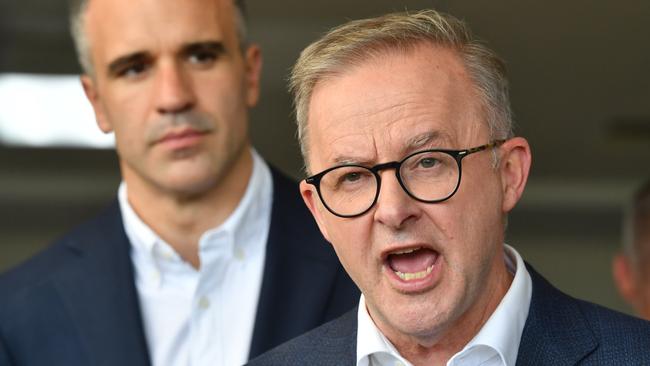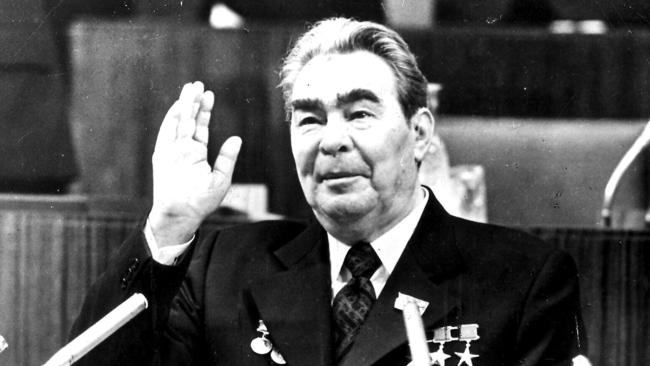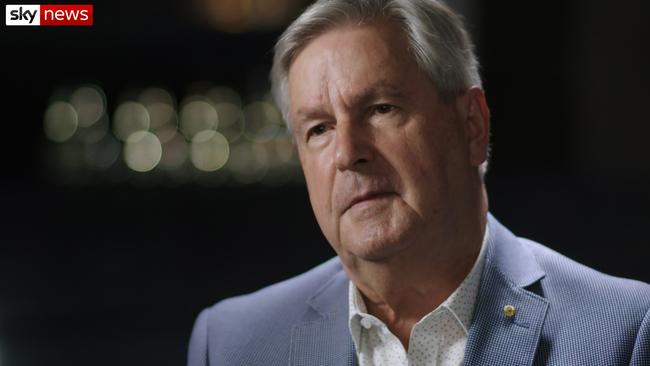Mali’s common sense clashes with Cold War-era Labor ideas | David Penberthy
The same old Sydney-centric response to the SA Premier was more indicative of Labor’s past than its potential future, writes David Penberthy.
Opinion
Don't miss out on the headlines from Opinion. Followed categories will be added to My News.
It was more a Pavlovian response than a nuclear one. Within hours of Paul Starick’s exclusive interview with Peter Malinauskas where he urged a mature rethink about the nuclear power question, Labor’s two most senior Left faction figures were out of the blocks to slap him down.
The fledgling Premier attracted the attention of no less a pair than the Prime Minister of Australia Anthony Albanese and former deputy opposition leader, Environment Minister Tanya Plibersek, bluntly declaring him “wrong” in urging a national nuclear debate.
The refreshing ideological detachment which Malinauskas showed in his comments to Starick was the opposite of the blanket kneejerk rejections offered by Albo and Plibersek.
Their obstinance on the question was made even stranger by the fact that Malinauskas was not even arguing we should set up a nuclear industry forthwith.
Rather, he was suggesting we have a thoughtful conversation – based not on ideology but science and economics – about whether nuclear power was desirable and affordable as we strive for more carbon-free energy sources.

No, no, Mali. What the hell were you thinking with this outrageous display of common sense?
On this issue, what we saw from the PM and Plibersek was a reminder that, while the Albanese government might be new, many of its key personnel are actually quite old, if not in age then in their thinking.
The response from the federal government was more indicative of Labor’s past than its potential future, put by two people who were at uni when Chernobyl melted down and the Cold War was still going.
It also reminded us of Albanese and Plibersek’s roots as the products of Labor’s inner-Sydney Left faction, who have spent more time fending off the Greens than the Liberals in their seats of Grayndler and Sydney.
I lived in this part of Sydney for 12 years and it really does have a uniquely radical take on life.
In Albo’s seat, Marrickville Council was the first in Australia to declare itself a nuclear-free zone.
A decade ago it fell prey to a gaggle of Israel boycott advocates who, showing an offensively scant knowledge of history, even suggested they draw up an online list of Israeli-linked businesses in Sydney’s inner-west for people to avoid.
It was like a more polite version of Kristallnacht, and to his credit one of its biggest local critics was the now-PM.
Against this backdrop, the disagreement between Mali and the Sydney duo was one between a new Labor person not wedded to the past, and keen to think freely, and older Labor people who have been thinking the same way since Leonid Brezhnev was still alive.
The policy arguments they put forward against what Malinauskas actually said were also flimsy in the extreme.

Plibersek’s was just hysterical, sounding more like it was aimed at placating Green or teal voters by attacking Malinauskas on the basis of something he didn’t even say.
“I don’t know if there are people on your street who want a nuclear reactor in the local park,” she said.
Keen as I am on the idea, I am pretty sure Mali wasn’t propping Wellington Square in North Adelaide as his preferred reactor venue.
Albanese’s criticisms went to cost and safety, principally around the disposal of waste.
That waste argument is a tough one to put convincingly in South Australia given that we have a thorough and well-researched royal commission report (now gathering dust) which explained exactly how nuclear waste could have been disposed of in our own state.
That report by former Governor Kevin Scarce did not fail due to a lack of rigour. It failed because of petty partisan politics and the election-eve absence of courageous leadership. First from then opposition leader Steven Marshall in withdrawing bipartisan support for the endeavour, then from premier Jay Weatherill in using the vacuous vehicle of a Citizen’s Jury to kill it dead, with the intellectual equivalent of a year 10 social studies essay penned by unqualified jury delegates putting a dagger through a good idea’s heart.
As for the cost question, the most recent federal budget gives stunning insight into how much we are currently spending on other energy sources to meet our power needs.
I’m not anti-renewables; on the contrary I would argue that renewables absolutely must be our energy future.
But the level of current public investment suggests this nascent sector is having trouble washing its own face.
This from the budget papers in October: “This budget commits record funding of almost $25bn to clean energy spending, providing greater direction and backing the government’s net zero commitment by 2050.

It includes funding for projects that unlock opportunities for clean energy and renewables investors.”
The figures from the Western Australian budget also tell an interesting story about our vast economic over-reliance on the mining industry in that state – an industry which does more to produce carbon emissions than any other in the land.
We have a weird position as a country where we won’t consider nuclear power as an energy source, and we won’t consider accepting and storing nuclear waste, even though we have the perfect geography, seismic stability and remoteness, and could make a mind-blowing amount of money if we did.
Meanwhile, the WA budget figures show that in 2020-21, WA accounted for well over half of national goods exports, with mineral and petroleum sales growing by $38bn to $210bn.
They are staggering numbers, ones which prop up a Federal government that claims to be environmentally pure, yet funded by mining royalties generated by digging bloody great holes in the ground.
All up it’s been an interesting lesson this week for Mr Malinauskas, namely that when it comes to politics, a surfeit of common sense can get you into strife.




